BBC Research & Development has been exploring new ways of storing and using data, especially personal data, for several years. In 2017, we announced a project with Nottingham University called Databox, followed by an experiment with a prototype device we named BBC Box in 2019.
Built on Databox and powered by a Raspberry Pi, BBC Box pulled your data together in one place. Most recently, my colleagues Bill Thompson and Max Leonard published a blog post about putting data at the heart of the BBC. Since then, we've been exploring personal data and the latest personal data store technology.
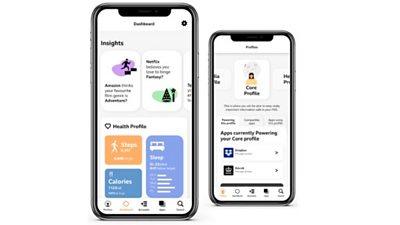
According to the World Wide Web creator, Sir Tim Berners-Lee, reconfiguring the web so that its users own and manage their data can turn the world 'the right way round'. We think this is right and believe that giving people the chance to control their personal data could completely transform the current system.
With this in mind, our latest work focuses on reinventing how data is stored, processed and controlled online – changing how people think about and use personal data.
Our research team focused on the needs of young audiences (under 35s) who aren't regular users of the BBC's apps and online services, aiming to gain trust, relevance, and find new ways to support the BBC's reputation and position for future generations.
We recently tested our first personal data store prototypes – and can share what we've been working on so far and our findings.
Why is the BBC researching personal data stores?
We believe a change in the way people can manage their personal data has a broader public value. Recent research found:
- At least 39 different organisations hold personal data on the average UK citizen.
- 82% of people are unsure of what personal information companies hold about them.
- Only 1% of people read the terms & conditions.
It's the BBC's responsibility to look at how we can help make a positive impact for our audiences. We believe there's enormous room for improvements with how data is managed online – and our long history of researching and using established and emerging technologies can help move the industry forward to create public value and make a better internet.
Rather than big organisations holding personal data under their control, there are possibilities for people to have greater agency over their data - who can identify them, where and how their personal data is stored and what data services they can access. Eventually, this will also include transparency and choice over how services use personal data.
Alongside this, we also believe audiences will benefit from BBC services that are more relevant and targeted to them. Relevance is vital for the BBC, and data has a part to play in this. The introduction of sign-in, for example, now means audiences can get personalised recommendations across BBC iPlayer, BBC Sounds and the BBC homepage. Technology like personal data stores could be transformative and support our ambition to create tailored and personalised content. We expect there will be technology from our findings which could be transferred and integrated into existing BBC products and services – and in the future, we may also create new products and services.
The user research and prototypes we're currently working on are an extension of our previous projects and are a natural next step. Our ambition is to move the industry in a positive direction by showing that personal data can be done differently. We want to be transparent with our findings so as many people benefit from them as possible; that's why we're doing this research in the open and sharing our results publicly.
- BBC R&D - The potential of data in modern public service media
- Wired - The BBC’s radical new data plan
- BBC News - Personal online data to inform BBC audience choice
What have we produced?
We've been working on personal data store prototypes to test the technology and its potential benefits. We've been working on:
Technical prototypes
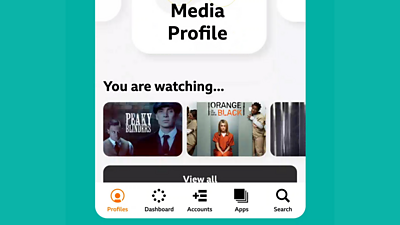
We developed a web app that uses live personal data from the BBC, Spotify and Netflix to create a media profile for a user. The media profile allows the user to view and edit their entire media viewing history in one place. We can then send a profile derived from this data to our research version of BBC Sounds to provide enriched recommendations and suggestions of relevant local events.
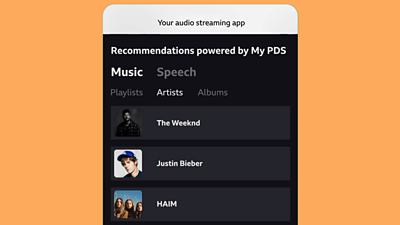
UX prototypes
These more speculative prototypes looked a bit further into the future to outline a more comprehensive product we call 'My PDS'. My PDS has multiple profiles, including media, health, finance and social. These profiles visualise and bring to life personal data which has been imported into My PDS.

We also created a central dashboard, allowing users to view, edit and manage data as well as a selection of services that sit alongside My PDS. Our vision is that services can be produced by organisations other than the BBC to create a data ecosystem and that a range of providers can offer the underlying PDS.
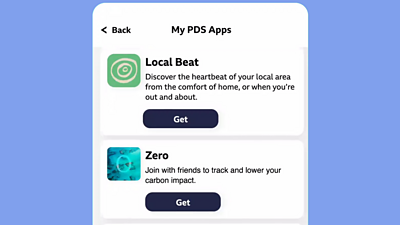
Educational materials
We created video explainers on what personal data is and what personal data stores are. We also produced an introduction to My PDS to bring a complex subject to life for audiences.
What technology did we use?
Our system is built on an open-source tool called Solid, initially developed by Web inventor Sir Tim Berners-Lee. Solid stores user data in 'pods', and we have used these to build a user-centred data storage system and a prototype media discovery tool to test our ideas in practice. We have been working with a version of Solid implemented by Inrupt, founded by Sir Tim.
We chose to work with Solid for the following reasons:
- It is open-source and is essentially a set of standards so we can build our own, and crucially for this initial trial, we can dig deep into any aspect due to Solid's open-source nature.
- It is web-native and embodies the principles of the web, especially universal access, which is one of the essential principles in the way we deliver our services.
- There is a large and active developer community.
- The commercial support on offer.
How are we evaluating what we created with audiences?
While building the prototypes, we worked on a research programme alongside research agency YouthSight to design and test our ideas and thinking. This included a national survey of over 1,500 people and a two-week qualitative research study with 25 participants under the age of 35.
Throughout the two weeks, participants were introduced to our prototypes and educational materials, taking part in focus groups, online discussions, design reflections, one-to-one interviews and a live trial. The research aimed to get views on the potential for personal data stores as an alternative way to manage data, test the appeal for additional services and get feedback on our prototypes and potential designs.
Our four main takeaways after analysing the findings are:
Lack of understanding and confidence with personal data
We found that most of those involved in our research want to take steps to manage their personal data but don't know how.
Openness to using a personal data store
People of all ages said they'd be happy to use a personal data store and think it is better than what we have now. Their key benefits were being able to control data and see it come to life visually.

The need for oversight and control
Seeing who collects, shares and uses data and controlling permissions is important to young people.
The profiles are valued
We had positive feedback on the profile prototypes, with people interested in ones that help manage and inform lifestyle choices and behaviours.
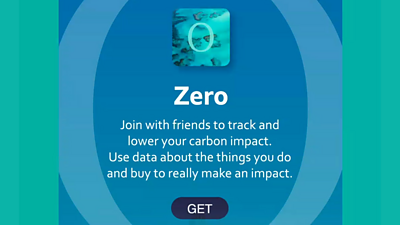
The findings inform our next steps and will shape the vision and roadmap of the project in the future. Following the positive feedback for the profiles, one of our priorities will be to continue work on the media profile to make it as compelling as possible.
What's next?
We've been researching the future development of the internet and ways it can be enhanced to deliver public value for many years. This work on creating a public service data ecosystem covers just one part of this – but we hope our findings will contribute to improvements in the wider industry.
With that in mind, we are collaborating and demoing with other organisations working with Solid, including Belgian broadcaster VRT, NatWest and the digital team at the Ministry of Justice. We will also be speaking at events and conferences as we share our findings with the world.
Next up, we'll be using the research findings to help build on our work so far. We'll also be looking at how we can scale up for larger trials in the future and having discussions with potential internal and external partners on possible services and features. Finally, there will be more studies and evaluations into the longer-term impact of work in this area. Creating and testing these prototypes is just the beginning – we look forward to sharing our next update.
Interactive Presentation - BBC R&D Showcase
In this interactive experience discussing the use of personal data you can choose what you would like to know more about from our engineers.
- BBC R&D - Introducing the BBC Box
- BBC R&D - Putting audience data at the heart of the BBC
- Wired - The BBC’s radical new data plan
- SlashGear - BBC Box personal cloud aims to rewrite the rules on internet privacy
- BBC News - Personal online data to inform BBC audience choice
- BBC R&D - Personal Data Stewardship
- Databox
- BBC R&D - The Ethics of Personal Data
- BBC R&D - Data Science Research Partnership
- Broadcast - BBC tackles data safety with ‘disruptive’ device
- Gizmodo - BBC Box personal cloud aims to rewrite the rules on internet privacy
